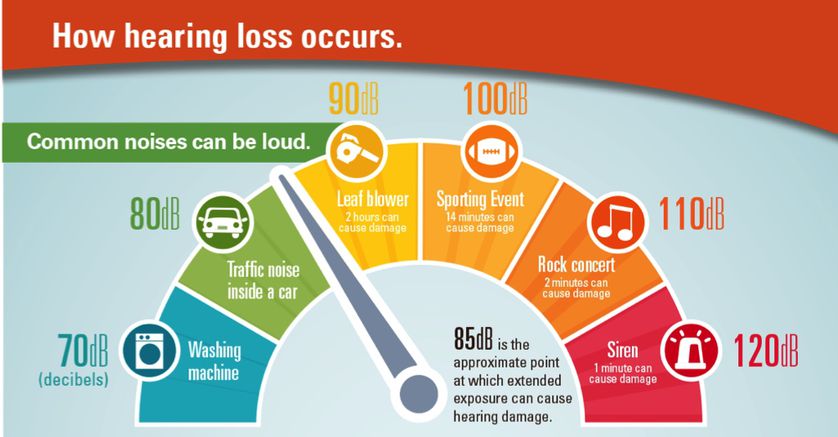Nick Hunn was the first to use the word “hearables.” When the wearables craze started a few years ago, he wrote “forget wristbands – the ear is the new wrist.” In a new article he goes further, saying, “Forget the Internet of Things (IoT) – it’s a bubble.” He thinks the future is the Internet of Voice, following the trend set by Alexa in Amazon’s Echo.
Why is this important? In five years, if voice recognition continues to improve at its current pace, then people may look back and wonder why they ever used a keyboard. But there’s another aspect to that evolution – people may also wonder why they ever tapped a smartphone.
The numbers are staggering. (Photo: CDC)
But living in the Internet of Voice era also means we’re living in the Internet of Hearing. Research published by the Centers for Disease Control and Prevention shows a surprising number of younger people already have significant hearing loss: 20 percent of people in their 20s have lost the ability to hear some of the softest sounds. Meanwhile, a quarter of 40- to 49-year-olds and half of 50- to 59-year-olds also suffer from hearing loss. Lenny Bernstein writes in the Washington Post:
The review’s more surprising finding — which the CDC had not previously studied — was that 53 percent of those people said they had no regular exposure to loud noise at work. That means the hearing loss was caused by other environmental factors, including listening to music through headphones with the volume turned up too high.
“Noise is damaging hearing before anyone notices or diagnoses it,” said Anne Schuchat, the CDC’s acting director. “Because of that, the start of hearing loss is underrecognized.”
Rock concerts and leaf blowers
It doesn’t take long to do damage, according to the CDC, and this infographic shows just how that can happen:

Turn down the volume! (Photo: CDC)
The Better Hearing Institute tells us that the effects of untreated hearing loss include:
- irritability, negativism and anger
- fatigue, tension, stress and depression
- avoidance or withdrawal from social situations
- social rejection and loneliness
- reduced alertness and increased risk to personal safety
- impaired memory and ability to learn new tasks
- reduced job performance and earning power
- diminished psychological and overall health
They might need to add inability to interact properly with Siri, Cortana Google Now and Alexa. Especially Alexa, the voice of the Echo, which appears to be way ahead of the curve. Hunn quotes the director of product development for Amazon’s device:
Every day, hundreds of thousands of people say “good morning” to Alexa. Half a million people have professed their love. More than 250,000 have proposed. You could write these off as jokes, but one of the most popular interactions is “thank you” – which means people are bothering to be polite to a piece of technology.
To have this kind of relationship with a device, you have to be able to talk to it and to hear it clearly. If Hunn is right, soon it may be as important to have good hearing as it is to have good eyes or glasses today. He explains:
It’s difficult to underestimate the importance of this change. Whilst some may find it creepy, just asking a question is so natural that it’s difficult to understand why it has taken so long to get there. The reason for that delay is that voice recognition is difficult. It’s needed a number of different technology enablers to come together: reliable, fast internet speeds for users, low cost, low latency cloud services and the machine learning for voice recognition to move it from novelty to everyday reality. Put them together and we’re now at that point where we can envisage a conversational internet.
But you can’t have a conversational internet if you can’t hear properly. Young people should protect their hearing now and anyone over 50 should get their ears tested or they’ll be left behind.
What’s the state of your ears?

How old are your ears? (Photo: WSIB)
Digby Cook of Hearing Loss Journal points to a simple online test you can try to see how old your ears are. He writes:
I generally don’t recommend online hearing tests since they can’t replace a proper test by a qualified audiologist. But this one is simple to do, and it offers a rough idea of the state of your hearing. It was posted by Ontario’s Workplace Safety and Insurance board.
Before the Internet of Voice goes any further, you should find out: How old are your ears?
